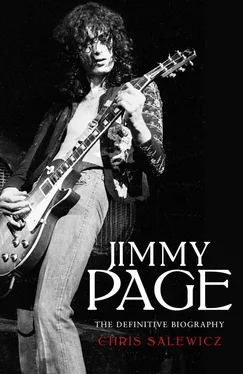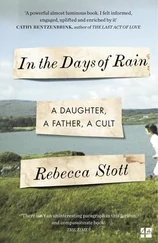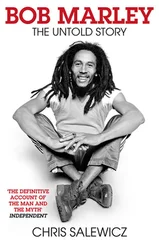‘So I said, “Great, let’s have him,” and they said, “Well, you can’t get him here because he’s in art school.” I said, “What?” He showed up … with paint on his jeans and he was the youngest player in the room. I went over to him to play a few of my piddling chords, and when he played them back to me I was almost knocked out of the room. Even then, he was spectacular. I knew right then that he was an amazing talent, so he played on a song of mine called “Don’t Turn Your Back on Me” and we did some writing together.’
There was, however, an attraction beyond his guitar-playing skills and Jackie DeShannon’s own musical abilities. ‘We got together afterwards,’ Page said in an interview in 1977 when he revealed how she enticed him with a very attractive proposition: ‘She said, “I’ve got a copy of Bob Dylan’s new album if you’d like to hear it,” and I said, “Would I like to hear it?”’
For most of 1965 Page and Jackie DeShannon were an item, and this almost-eminent American songwriter took him under her wing; together they wrote the song ‘Dream Boy’, a rocking single, like Ronnie Spector handling a surf tune. At the time Marianne Faithfull felt that Page was ‘rather dull’. She saw his relationship with DeShannon as his way of ‘undulling himself’. Tony Calder, her manager and close associate of Rolling Stones manager Andrew Loog Oldham, recalled that ‘One night I couldn’t get into our hotel room because Jimmy and Jackie DeShannon were in there shagging, so I yelled, “When you’ve finished could you write a song for Marianne?”’
The result was Marianne Faithfull’s second hit, ‘Come and Stay with Me’, which reached number four. ‘In My Time of Sorrow’, an album track for Marianne, also emerged from this partnership.
‘We wrote a few songs together, and they ended up getting done by Marianne, P. J. Proby and Esther Phillips or one of those coloured artists … I started receiving royalty statements, which was very unusual for the time, seeing the names of different people who’d covered your songs,’ said Page.
But how must it have felt for Page to be having sex with someone who had been to bed with two of his idols, Elvis Presley and Ricky Nelson? No doubt it considerably boosted his sense of himself and who he could be, given his increasing belief in psychic connections and the powerful, allegedly transcendent energies of Aleister Crowley’s ‘sex magick’.
Page was always financially astute. Early in 1965 he had set up his own publishing company, and soon, urged on creatively and emotionally by Jackie DeShannon, he was making his first solo record. ‘She Just Satisfies’ was a Kinks-style rocker, released on the Fontana label, on which he sang; its B-side was another Page–DeShannon tune, ‘Keep Moving’. Hearing it now, ‘She Just Satisfies’ sounds like it could have been a likely chart contender.
‘“She Just Satisfies” and “Keep Moving” were a joke,’ Page later said, dismissing the record with an element of false modesty. ‘Should anyone hear them now and have a good laugh, the only justification I can offer is that I played all the instruments myself except the drums.’
In his 1965 interview with Beat Instrumental magazine, Page was asked about the possibility of a follow-up to ‘She Just Satisfies’. He rejected the notion saying, ‘If the public didn’t like my first record, I shouldn’t think they’ll want another.’
In March 1965 DeShannon took Page on his first trip to the United States, first to New York and then to Los Angeles. For the guitarist, who later admitted his first impressions of the USA came from the glamour of Chuck Berry’s witty, lyrically descriptive songs, life was suddenly opened up almost unimaginably.
In New York, Page crashed in the spare room of Bert Berns’s sumptuous Manhattan penthouse apartment, with the producer, who was in town, and his Great Dane and pair of Siamese cats. While Page was in the Big Apple, the ever-dynamic Berns produced Barbara Lewis’s ‘Stop That Girl’, a song written by Page and DeShannon; this mid-tempo heartbreak ballad was included on the Michigan soul songstress’s Baby, I’m Yours LP, released on Atlantic that year. Through Berns, Page met Ahmet Ertegun and Jerry Wexler, the head honchos of Atlantic Records; it was a connection that would prove exceptionally valuable. Berns also ‘took him to an Atlantic session, where he strummed along uncredited because of the union and immigration’.
Then Page flew to the West Coast. With its warm whisper of fecund possibility, Los Angeles in the mid-1960s seemed like a mythical setting. Almost all knowledge of the city was informed by its portrayal in movies, with Hollywood almost like the Holy Grail. With many of its inhabitants drawn from across the globe by the hope of stardom, LA housed some of the most beautiful individuals, of either sex, that any urban conurbation could boast.
The perfect weather of Los Angeles, its motorised modernity, gorgeous landscapes and fascination with alternative, free-thinking lifestyles – since the 1920s the city had been known for its practitioners of the more arcane, esoteric arts – made for an attractive package.
But its air of affluence could be illusory. In August 1965, when the foreign press went looking for the riots in the south Los Angeles district of Watts, many newshounds famously drove straight through the neighbourhood. Searching for a ‘black ghetto’, they were unable to believe that this place, with its palm trees and neat bungalows, could be the scene of murderous urban discontent.
The Watts riots were in stark contrast to the received wisdom about Los Angeles and southern California in general. But they were also a metaphor for the darkness that lay at its heart, always ready to erupt, like the city’s ever-present threat of earthquake.
It was already apparent that Page had a nose for the zeitgeist, and here he was ahead of the times: for shortly Los Angeles would become the world’s popular-music capital. ‘I first came here in 1965 when I was a studio musician,’ he told the Los Angeles Times in 2014. ‘Bert Berns brought me out. He invited me to stay at his place. I met Jackie DeShannon, I saw the Byrds play at Ciro’s [the Byrds debuted at Ciro’s on 26 March 1965], which I think is now the Comedy Store. It was a magical time to be here. It was really happening.’
One morning he walked into the coffee shop at the Hyatt House on Sunset Boulevard. Seated there, having his breakfast, was Kim Fowley, a veteran of the Hollywood music scene who had been involved with the Hollywood Argyles, B. Bumble and the Stingers, and the Rivingtons; in London, where he had met Page, Fowley had worked with P. J. Proby. ‘In he comes, Mister boyish, dressed in crushed velvet. He spotted me, and came and sat down. He told me he’d just had the most insane, disturbing experience.
‘A well-known singer-songwriter of the time, a pretty blonde, had asked him over to her house. When he got there, she’d detained him. He said she’d used restraints. I asked if he meant handcuffs and he said yes, but also whips – for three days and nights. He said it was scary but also fun. They say there’s always an incident that triggers later behaviour. I contend that this was it for Jimmy Page. Because being in control – that became his deal.’
After a few months this early example of a rock ’n’ roll couple went their separate ways. ‘He wanted to split from the music world because he was getting disillusioned,’ said Jackie DeShannon. ‘Jimmy wanted to go to Cornwall or the Channel Islands and sell pottery. He couldn’t stand the business, the strain, and I couldn’t stand his dream of quietness, so we split, but I guess he’s changed a lot since then.’
Читать дальше












